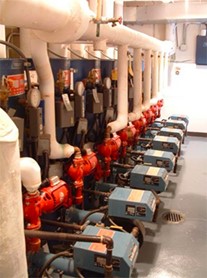The Meadowlawn Plaza Apartment Complex in Mitchell, South Dakota was constructed in 1972 as a HUD (Housing and Urban Development) project providing 118 apartments for low-income elderly independent living. In the 1960s and 1970s, HUD helped spark the production of millions of units of privately-owned apartments for elderly, handicapped and lower income Americans. In the 1970s, when soaring inflation and energy costs threatened the survival of thousands of private apartment buildings and limited the development of new ones, HUD was the moving force behind housing projects in almost every small, medium, and large city in the United States.
The Meadowlawn Plaza Apartments project, like many others, had original specifications calling for twelve Triad Series 300 space heat hot water heating boilers and four Triad Series 300 combination heating and domestic hot water boilers to be evenly distributed in two separate boiler rooms. These boilers were chosen because they save space while providing comfort with heating and domestic hot water from one vessel.
In keeping with the Triad boilers’ well-known longevity, this system provided heat and domestic hot water to the facility for 24 years, until 1996, when a single small leak developed in the internal heat exchanger of one of the original domestic hot water boilers.
A nearby contractor had been involved with this facility since 1995 and continued to provide service for the facility under an annual contract. The solution to the leaking boiler was simple–as the original sixteen boilers were still in place, but with their original atmospheric burners, it was decided to replace all of them with the new model Triad Series 300 with space heat and combination space heat and domestic hot water capabilities with more efficient power burners.

Since the piping arrangement on these boilers had remained the same over the past 25 years, the installation was very simple and cost effective. Each boiler room also had a lead-lag sequence panel installed to control the sequencing of the boilers based on outdoor and return-water temperatures.
The dependability of the original systems combined with the simplicity of replacing “like for like” equipment was an easy sell to the mechanical engineer and owner. Both had been very happy with the performance of the original Triads and impressed with their uniquely rugged construction. The 12-gauge firetubes and 3/8” thick tube sheets held up well for all those years.
